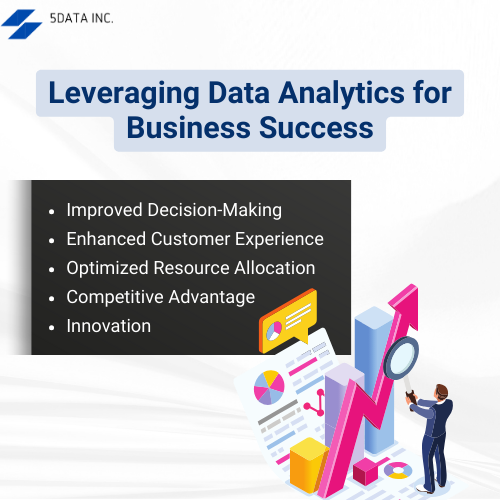In today’s data-driven world, businesses are awash in information. From customer interactions to customer satisfaction, operational metrics, and market trends, the sheer volume of data can be overwhelming. It is where data analytics steps in, transforming raw data into usable insights that empower businesses to make informed decisions. This article examines how data analytics significantly influences business decision-making, covering essential concepts, techniques, and advantages in the field.
Key Takeaways
- Data analytics converts raw data into strategic insights, enabling informed decision-making.
- Identifying inefficiencies and optimizing resource allocation enhances productivity and efficiency.
- Customer data analysis reveals preferences, enabling personalized marketing and better satisfaction.
- Data-driven decisions improve product development, market expansion, and risk management.
- Building data literacy and ensuring data quality boosts effective decision-making.
From Raw Data to Strategic Insights
Big data analytics possesses a remarkable ability to convert raw, unprocessed data into strategic insights for decision-makers. However, this transformational journey from data collection to data analysis and decision-making processes and-making involves several critical steps:
- Data Collection: Initially, data is collected from diverse sources such as internal databases, customer interactions, social media platforms, and market research. Data Collection and Data Management Service Providers offer essential expertise in handling and organizing vast quantities of information efficiently.
- Data Cleansing: Primary data often contains inconsistencies and errors. Data cleaning ensures data accuracy and completeness before proceeding to analysis.
- Data Analysis Techniques: Depending on business goals, organizations utilize various techniques like statistical analysis and machine learning to derive valuable data insights. Graphical visualization, achieved through charts, graphs, and dashboards, aids in clarifying and effectively communicating complex information.
- Operational Efficiency and Cost Optimization: Identifying inefficiencies and optimizing resource allocation to enhance productivity and overall operational efficiency.
- Customer Understanding and Satisfaction: Analyzing data to gain insights into preferences, behaviors, and sentiment, enabling personalized marketing strategies and improved customer service.
- Strategic Decision-Making: Empowering evidence-based decisions across all levels of the organization, from product development to market expansion and risk management.
- Challenges and Considerations: Successfully implementing data analytics strategies involves overcoming challenges such as data privacy concerns, ensuring data validation and accuracy, and fostering a data-centric culture within the organization. It requires investments in technology, talent, and robust governance frameworks.
- Data Visualization: Presenting insights in a clear and visually appealing format using charts, graphs, and dashboards facilitates understanding and communication of complex information.
- Machine Learning: Advanced algorithms learn from data to make predictions about future events, particularly valuable for predictive analytics.
- Predictive Analytics: By analyzing historical sales data, identifying patterns, and identifying trends, businesses can anticipate future market trends and consumer behavior, enabling proactive decision-making and risk mitigation.
This journey underscores the transformative power of using big data analytics in driving informed decision-making and achieving competitive advantage in today’s dynamic business environment.
Leveraging Data Analytics for Business Success
Implementing big data analytics with business operations offers businesses a multitude of benefits:
- Improved Decision-Making: By making decisions based on concrete data, businesses can ensure more informed decision-making, leading to enhanced outcomes.
- Enhanced Customer Experience: By employing data analytics, businesses can tailor customer experiences, resulting in higher satisfaction levels and enhanced customer loyalty.
- Optimized Resource Allocation: By identifying areas of waste and inefficiency, data analysis helps businesses allocate resources more effectively.
- Competitive Advantage: Businesses that utilize data analytics obtain crucial market insights and understand consumer behavior, positioning themselves ahead of competitors.
- Innovation: Data can spark innovation by revealing new opportunities and informing product development strategies.

Building a Data-Driven Culture
To fully harness the power of the big data analytics used in business now, businesses need to cultivate data analysis and culture. Here are some key steps:
- Data Literacy: Employees across all levels need to develop basic data literacy skills, enabling them to understand and interpret data effectively. It fosters a culture where data is valued and utilized for decision-making.
- Integrating Data: Businesses need to break down data silos and integrate data from various sources. It allows for a holistic view of the organization and facilitates a more comprehensive analysis.
- Data Analysts and Data Science: Experienced data analysts and data scientists are essential for extracting valuable insights from data. Businesses should prioritize investing in robust data teams or partnering with external data analytics experts.
- Data Quality Management:Ensuring data quality is paramount. Businesses need to have processes in place for data cleansing, validation, and ongoing monitoring to ensure the accuracy and reliability of data analysis.
- Data Governance: Data governance establishes policies and procedures for data access, security, and privacy. It ensures responsible data usage and builds trust within the organization.
Data Life Cycle Management Services encompass the comprehensive management of data from its creation to its archival or deletion, ensuring compliance and efficiency throughout. These various supply chain management services optimize data usage, storage, and security, promoting customer satisfaction through streamlined operations and regulatory adherence leveraging historical data analysis.
Data Analytics and the Future of Business
Big data analytics is not a passing trend; it’s the future of business. As technology continues to evolve and data generation becomes even more voluminous, businesses that excel at leveraging data analytics will thrive. Here are some key trends to consider:
- Advanced Analytics: Incorporating advanced analytics techniques like machine learning and artificial intelligence (AI) will continue to transform data-driven decision-making, facilitating real-time data analysis and precise predictions.
- Integration with Business Applications: Data analytics is set to seamlessly integrate with diverse business applications, such as CRM and ERP systems, offering real-time insights that steer operational decision-making.
- Focus on Customer Experience: Businesses will increasingly leverage data analytics to personalize customer experiences across all touchpoints, leading to deeper customer engagement and loyalty.
- The Rise of the Citizen Data Scientist: With user-friendly data visualization tools and simplified data analysis platforms, more employees will become citizen data scientists, empowered to analyze customer data and contribute to accurate decision-making.
Conclusion
The impact of big data analytics on informing business decisions is profound and multifaceted. Through the integration of data analytics into their operations, organizations can secure a competitive advantage, foster innovation, and realize sustainable growth. However, realizing these benefits requires a strategic approach to data acquisition, analysis, and interpretation. Moreover, fostering a data-driven culture and addressing challenges such as data privacy and quality are essential for maximizing the transformative potential of data analytics. As businesses advance in the digital era, those proficient in leveraging data analytics will excel in navigating complexities, seizing opportunities, and providing exceptional value to customers and stakeholders.
Frequently Asked Questions (FAQS)
How does data analysis affect business decision-making?
- Data analysis enhances business decision-making by providing insights derived from systematic examination of data. It helps businesses understand and predict future trends, customer preferences, and operational performance, enabling informed and strategic decision-making.
How does big data analytics impact the decision-making process in business?
- Big data enables businesses to analyze large volumes of complex and diverse data sets at high speed. This capability enhances data-driven decision-making by uncovering insights that traditional data analysis methods may overlook, facilitating more accurate predictions and proactive strategies.
How does data analytics affect the decision-making processes in business organizations?
- Big data analytics transforms decision-making by shifting from intuition-based to data-driven decision-making approaches. It empowers organizations to make objective decisions based on factual evidence and quantitative analysis, leading to improved outcomes and competitive advantage.
How do business analytics help in decision-making?
- Business analytics leverage advanced analytical techniques to extract meaningful insights from data. These insights guide decision-makers in optimizing operations, identifying growth opportunities, understanding customer behavior, and mitigating risks, ultimately driving business success.

Rasmita Patro
Author
